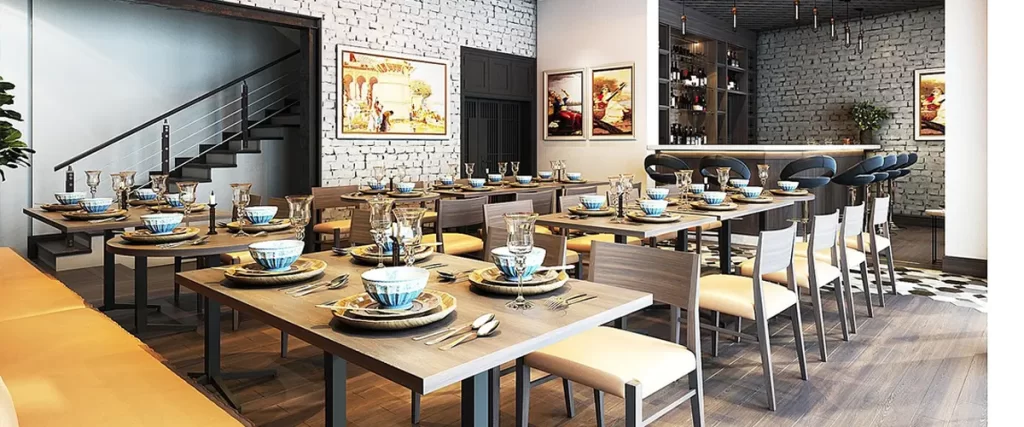Thinking about renovating a restaurant space in New Brunswick, NJ? You’re not alone. With a steady stream of foot traffic from Rutgers University, a thriving arts and food scene, and a growing residential population, it’s one of the most exciting places in Central Jersey to run a food business. But before you hang up the new light fixtures or redesign your dining room, there’s something crucial you need to deal with first: permits.
Renovating a restaurant in New Brunswick comes with specific rules and extra layers of approval, especially because of its dense downtown layout, college proximity, and historical building stock. If you’re not careful, you could end up in permit limbo or racking up costly fines.
This guide will walk you through everything you need to know, step by step, so your renovation project stays legal, smooth, and on schedule.

Renovating a Restaurant in New Brunswick? Here’s What You’re Up Against
Restaurants are one of the most heavily regulated commercial spaces you can own or lease. That’s true anywhere in the U.S., but it’s especially true in New Brunswick, where multiple layers of regulation from city planning to health inspections can affect your timeline.
And when your property is located near Rutgers University, you’ll face even more scrutiny because of zoning rules tied to student safety, crowd management, and alcohol-serving regulations.
Whether you’re:
- Building out a new kitchen
- Upgrading your dining room layout
- Adding outdoor seating
- Installing a new HVAC system
- Making changes to plumbing or accessibility
You’re going to need permits. And the city won’t issue them unless your renovation plans are 100% compliant with local laws.
The First Step: Understanding the New Brunswick Permit Process
The City of New Brunswick requires permits for any work that involves structural, electrical, plumbing, HVAC, fire suppression, or major cosmetic upgrades.
Visit the New Brunswick Division of Inspections for forms, guidance, and up-to-date codes.
Common Permits You’ll Likely Need:
- Building Permit – For walls, floors, ceilings, and load-bearing changes
- Electrical Permit – Any lighting, panels, or wiring updates
- Plumbing Permit – Changes to sinks, restrooms, water lines, or gas lines
- Mechanical Permit – HVAC upgrades or ventilation changes
- Fire Protection Permit – Required for sprinklers, hoods, and suppression systems
- Zoning Approval – Before starting any construction
- Health Department Review – Required for kitchen layout and food-prep areas
- Sidewalk Café Permit – If you’re planning any outdoor dining

Why Rutgers Proximity Changes Everything
If your restaurant is anywhere near Rutgers University, especially downtown near George Street, Albany Street, or Easton Avenue, expect added review. Here’s why:
1. Zoning and Crowd Management
Because of Rutgers’ dense student population, the city enforces stricter zoning regulations for businesses serving alcohol or late-night food. The city wants to avoid congestion, noise complaints, or safety issues.
2. Security and Safety
Restaurants near the university might be asked to submit security plans, especially if they plan on serving alcohol, staying open late, or hosting events.
3. Parking Requirements
The city’s zoning board may require your restaurant to demonstrate that there’s sufficient parking availability nearby, or request a variance if you’re in a tight spot.
Pro Tip: Always double-check your property’s zoning classification and permitted uses with the city before signing a lease or beginning renovations.
How to Get Ahead of the Process
Don’t let red tape kill your momentum. Here’s how you can stay ahead:
- Schedule a Pre-Application Meeting: The New Brunswick Division of Inspections offers early-stage consultations. Bring your plans and get honest feedback before submitting anything formal.
- Work with Locals: Hire an architect or engineer who has experience working in New Brunswick. They’ll know how to navigate local code quirks.
- Be Patient but Persistent: Some approvals (like zoning variances or fire suppression plans) take time. Follow up often and keep communication lines open.
- Submit a Complete Application: Missing details or vague plans are one of the top reasons permit applications get delayed or denied.
Best Renovation Material Manufacturers for Restaurants
Commercial-Grade Materials Are Key to Longevity and Code Compliance
Using durable, restaurant-friendly materials from trusted brands helps you stay compliant and reduce long-term maintenance.
Here are a few manufacturers known for top-tier restaurant renovation materials:
- Altro – Hygienic wall and flooring systems that meet health code standards
- Advance Tabco – High-quality stainless steel workstations, sinks, and shelving
- John Boos & Co. – Reliable cutting surfaces and prep tables
- True Manufacturing – Trusted for commercial refrigeration and display units
- Acme Brick Tile & Stone – Durable flooring options for front and back of house

Our Team Knows the New Brunswick Restaurant Scene, Inside and Out
We’ve worked on renovation projects all over New Brunswick, and we’ve helped dozens of restaurant owners like you bring their vision to life without running into city roadblocks.
We understand Rutgers-related zoning, downtown density concerns, and every city department that’s going to need to stamp your paperwork. We don’t cut corners, we cut through the clutter so you can open your doors faster and smarter.
Frequently Asked Questions
Do I need a permit just to repaint or update lighting fixtures?
If it’s a simple swap like screwing in a new lightbulb or painting a wall, then no. But if you’re installing new electrical wiring or changing layout, yes.
How long does the city take to approve a permit application?
It varies, but expect 2–4 weeks for straightforward renovations and longer if you need a zoning variance or fire plan review.
Can I renovate while still operating my restaurant?
You can, but it depends on the scope. Any work that interferes with food prep, restrooms, or fire exits will need to shut down operations during construction.
What if my restaurant is in a historic building?
You’ll need to go through the Historic Preservation Commission for approval, especially if your updates impact the façade.
Does the Rutgers proximity affect liquor licensing?
Yes. Restaurants within 200 feet of schools or churches (including Rutgers buildings) may face restrictions on alcohol sales. Check with the NJ Division of Alcoholic Beverage Control.
Do I need a health inspection for my renovation?
Yes, if your project affects kitchen layout, sinks, restrooms, or food prep areas, the Middlesex County Health Department must inspect and approve your plans.
What is a zoning variance, and how do I get one?
A variance lets you deviate from zoning rules (like seating limits or signage). You’ll need to submit an application and attend a zoning board hearing.
Can I add outdoor seating near Rutgers?
Yes, but you’ll need a Sidewalk Café Permit and approval from both the city and, in some cases, Rutgers property managers if it’s on university-owned land.

Final Thoughts: Make the Rules Work for You
Renovating a restaurant in New Brunswick can be one of the best investments you make if you do it right. Between the college crowd, the downtown vibe, and the mix of commuters and residents, the opportunities are real. But you’ve got to respect the process.
Start early. Get your paperwork in order. Partner with people who know what they’re doing. And remember: this is your restaurant. You deserve to open the doors with confidence, knowing every detail is squared away.
Need help making your commercial project happen? Contact us at (732) 913-0742. We’ll take it from here.
